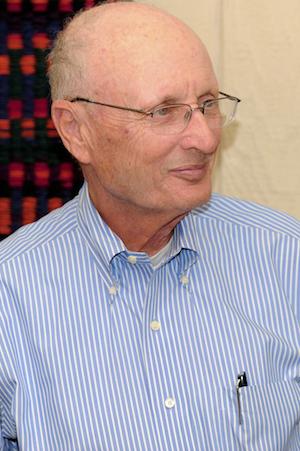In Memoriam: Professor David Binder, Trailblazer in Clinical Legal Education

David Binder, who served on the UCLA School of Law faculty for 50 years and gave generations of students the practical tools to succeed as lawyers, died on Sept. 15 after a long illness. He was 86.
A person of towering stature in the creation of clinical legal education, Binder co-founded and was the driving force behind UCLA Law’s trailblazing experiential education program from its inception in 1970 and throughout the following five decades. He is remembered by colleagues as someone who thought deeply about the theoretical, conceptual and practical ways in which students are best taught to become skilled lawyers — and who fought hard to put his progressive visions into practice.
“He had strong views about how to go about providing a first-rate clinical education, and he was of course a visionary force behind our creation of a ‘skills-centered’ approach to clinical education that focused on the step-by-step teaching of complex lawyering skills, both through thoughtfully developed simulations as well as real cases,” said UCLA Law Dean Jennifer Mnookin in a message to the law school. “While our clinical program today has a tremendous variety of offerings, there is no doubt that the careful, substantial focus on pedagogy and skill-building remains exceptionally strong here, and is a key part of David’s remarkable legacy here at the law school.”
Often collaborating with his UCLA Law colleagues Paul Bergman, Paul Boland and Albert Moore, Binder formulated many of the pedagogical practices that experiential educators continue to use today.
“David was the most logical thinker I’ve ever known,” says Professor Emeritus Bergman. “He was truly a pioneer of clinical education, and he changed my life when he hired me and the late Paul Boland to help him build UCLA Law’s clinical program. Those early ’70s years were magical: We had a sense of creating a form of education that never existed in law schools.”
Binder also wrote several of the seminal texts in the field. His eight books elucidated many of the practical aspects of lawyering for students at UCLA Law and far beyond. These guides included Lawyers as Counselors: A Client Centered Approach (West, 2019) with Bergman, Paul Tremblay and Ian Weinstein, and Trial Advocacy: Inferences, Arguments and Techniques (West, 1996) with Bergman and Moore.
“For 35 years, David was my colleague and friend at the law school,” says Professor Emeritus Moore. “He helped me, challenged me and inspired me in countless ways that shaped and defined my professional life at the law school as a scholar and a teacher. He was totally dedicated to his wife, his students, his colleagues and his profession.”
Binder was a Los Angeles native who earned his undergraduate degree from UCLA in 1956 and his law degree from Stanford in 1959. He was a partner in the law firm of Brown & Brown in Los Angeles and served as director of litigation for the Western Center on Law and Poverty before joining UCLA Law, where he was known to be a dedicated member of the community and an outstanding teacher who cared deeply about his students and colleagues.
During his half-century at the law school, he won every major teaching award: the university’s Distinguished Teaching Award, the Rutter Award for Excellence in Teaching and Professor of the Year. UCLA Law’s Binder Clinical Fellowship Program, which offers unparalleled training to the most promising experiential educators and has been a starting point for several longtime UCLA Law faculty members, is named in his honor.
“It is impossible to measure David Binder’s impact at UCLA Law and on clinical education, more broadly,” says Allison Korn, UCLA Law’s assistant dean for experiential education. “The concepts of client-centered lawyering and counseling, the significance of narrative and the importance of client autonomy are baked into our experiential program because of David’s pioneering work in clinical pedagogy and scholarship. I am among the generations of aspiring lawyers and clinical law teachers that cut our teeth on David’s texts and teaching methods, and I’m awed to consider how deep his legacy runs, not just across student and faculty communities, but through the hundreds of clients benefiting from reflective, empathic representation.”
Binder’s wife of 59 years, Melinda, died in 2016. They were fondly remembered as avid hikers who went on backpacking adventures to places including Nepal, Japan, Kyrgyzstan, Switzerland and Peru. Binder also spent summers teaching American law to university students in China, and he and Melinda taught literacy to underprivileged people in Los Angeles.
He is survived by three stepsons and their wives — Michael Crovitz and Laura Petrich, Charles and Jill Crovitz, and Jeffrey and Sarah Crovitz — plus grandchildren Zachary, Matthew and Madison, and great-grandchildren Roman and Zuzu. The family plans to hold a celebration of Binder’s life once the pandemic has passed, and in lieu of flowers, donations can be made to the Alzheimer’s Association of California.
UCLA Law is also planning to host a fitting tribute to Binder’s life and tremendous contributions to the law school, legal education and legal practice. Details will be announced when they are available.